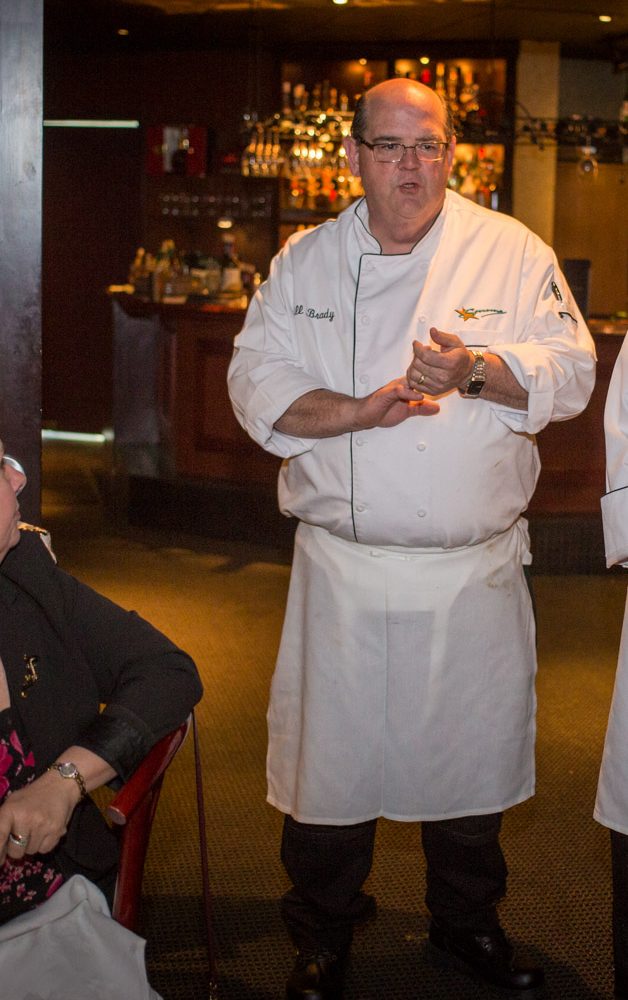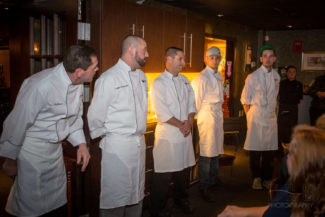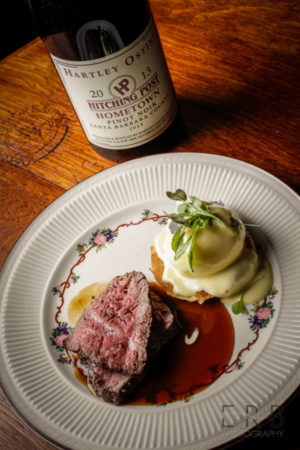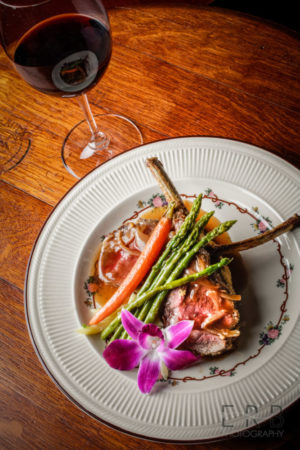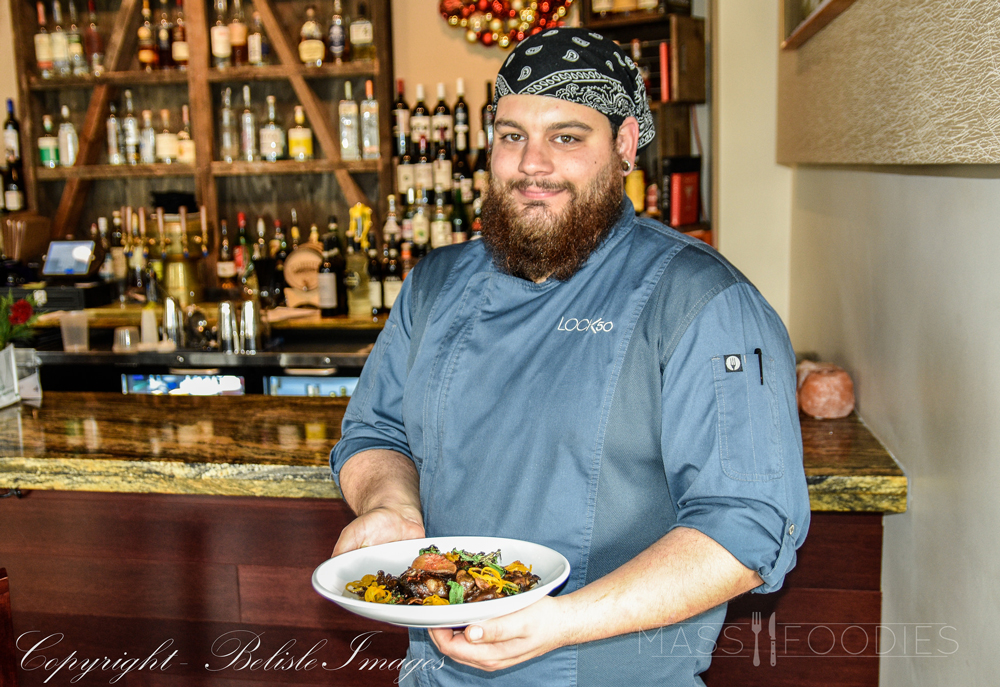
Tim Russo wants you to feel awful. The more awful the better as far as he is concerned when you come to Lock 50, his restaurant and café that opened in April in Worcester’s bustling Canal District.
Well, at least to a lot of people that’s what it sounds like Tim’s saying. But that’s not what he means. What he really wants you to feel is offal – the entrails, organs, and trimmed bits of animals used as food. Liver, tongue, thymus, heart … especially the heart. Chicken hearts, specifically. If our eyes are the windows to our souls, chicken hearts are the windows to Tim’s soul as a chef.
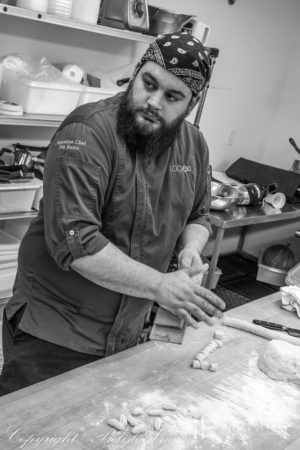
Sure the other parts of animals – as well as vegetables and grains – engage Tim and are on fine display on his menu. A pork shank is as refined as it is comforting; it’s seasonal accompaniments drawing on anything from tomato brodo in the summer to apples and Brussels sprout leaves in the fall. Steak? Yeah, Tim does his most recent with mushrooms, sweet and sour cherries, crispy bleu cheese, and rapini pesto but get ready for something new for Lock’s first spring (stay tuned). Tim also happens to be a master at gnocchi, which is the one thing his uncle and the owner of the restaurant, Ed Russo, will never let him take off the menu. The dish is even meat free: mixed with blue cheese, crispy sweet potato, and fresh scallion.
Gnocchi was actually the first “pasta” (technically a dumpling but many people think of it as pasta) Tim learned to make at home as a kid and they are easily among the best I’ve ever had. Or anyone else it seems, which is one reason they are his most popular dish (he sends out about 100 orders a week). The other reasons are they are the most familiar and accessible point of entry to Tim’s cooking – if you will, the gateway “drug” for his food for many customers. They may be, as he says, a “pain in the ass” to make but he’s giving the people what they want.
And Tim is all about his customers. They’re just a little different than he thought they would be at the outset – a little older demographic, more upscale, intrigued by the menu and location and happy with the charming intimacy of a space free of loud music. But they were also a little less adventurous than the post-college kids Tim expected. Which brings us back to those chicken hearts.
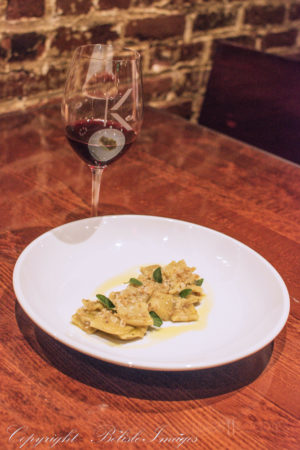
“This was the first place where I had complete control of the menu,” says Tim. “I said, ‘This is the concept, and this is what we are doing.’ I designed the kitchen too, which was a game of Tetris on drafting paper. Measure, move. Measure, move. Maximize the space and get the most and biggest pieces of equipment I could to make this what I wanted: a modern American space and menu like you see in New York, Boston, even Portland and Providence. A menu filled with stuff chefs like to eat – where people like me go, try some stuff maybe they have never tried, have some cool cocktails, and then go on to the next place. My menu was designed around weird, fun stuff.”
Like those chicken hearts, which he served on skewers as a bar snack. Hardly your typical Worcester bar fare – or your typical bar fare period. They didn’t last. But Tim has hope. At Armsby Abbey, where he served as executive sous chef, Tim worked with beef heart and tongue and he gave a little tongue at Volturno too with a beef tongue bruschetta that remains a hit. For now, Tim is adapting: “My very first concept menu was way out there, and I had to shut it down and create one that was more familiar and basic. We’re not quite that adventurous here yet. We’re getting there. I’m trying to get people to try stuff and realize it’s not weird or crazy or maybe you just had it prepared badly. Octopus is becoming pretty popular now, but so many people say it’s rubbery and gross. But my chilled sous vide compressed octopus is so tender it melts-in-your mouth. People just need to get past what they think they know.”
All this takes Tim back to growing up with his three sisters who were incredibly picky about anything put in front of them: “It’s terrible. When I started cooking as a kid I would try anything. They called me the garbage disposal because I would eat anything. I would always try and push my sisters and my friends. But they would say it was disgusting without even trying it. Just because of the name. Just try it! Now I’m trying to do that in Worcester on my own now.”
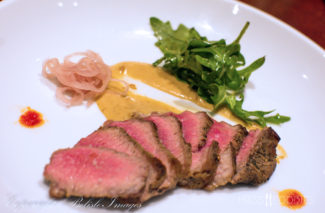
That is a point of pride for Tim, too: Because unlike many of the amazing chefs that are elevating the Worcester dining scene who come from surrounding towns or further afoot, Tim was born in Worcester and grew up here. He attended “The Voke” for culinary arts and first cooked at Maxwell Silverman’s. Following high school, he worked in Providence and got a degree from Johnson & Wales before decamping for Nantucket and eventually ending up back in here at Armsby Abbey and Volturno.
Tim is confident people will eventually respond just as they did when the hometown boy took first place Judge’s Choice and second place People’s Choice at the 2015 Worcester’s Best Chef Competition and was named Worcester’s Best Chef the same year. He’s encouraged by the little victories like the house-made Moroccan lamb sausage, which is taking off (he thought people would be skittish). Pricing is still a challenge though. The hurdle isn’t just the ingredients but that lingering perception that “quantity equals quality” and that Outback has a great steak that compares to what you would get at Lock 50.
“People don’t understand that we make everything from scratch,” Tim adds. “I put the best lamb in that lamb sausage and then all the time that goes into us making it here – four hours to break down and grind and sous vide and cook to order. That’s why you pay $14 for lamb sausage. It’s quality ingredients that took four hours of our time.
This is a huge learning curve that we need to understand.”
As customers do respond to more adventurous dishes, Tim slips some unfamiliar things alongside or inside the more familiar fare, or as Tim says: “Give people what they want while still giving them what you want too.”
“You want this but I am going to do it this way or add a little something,” he adds. “Inch those things back onto the menu more and more as we progress and gain a reputation. I’m thinking of doing a foie gras hot dog with the foie emulsified into the meat. If I were to do a burger it definitely would have something like bone marrow in it. So hot dogs and hamburgers but still something I made you try. Make it special.”
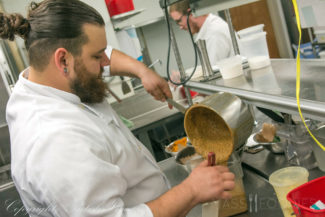
Tim’s already there with his Meat Board: He started putting chicken liver pâté next to the house-made charcuterie and other high-quality cured meats. “A lot of people say, ‘That’s gross I hate liver,” he says, glancing over at Ed at the bar. “He said he hates liver. ‘I’m not eating liver.’ I gave him some pâté on the board and he admitted it was delicious. Putting it on the board you sort of get people with things they already eat. ‘Hey it’s there I might as well taste it.’ And they generally enjoy it. It was just the perception that it’s gross and they won’t like it.”
He also gets to do that with the Lock 50 tasting menu, which is a blind tasting of five or seven courses with or without wine. He hasn’t gone too crazy yet, because he wants his customers to come back so maybe he waits for their second visit to slip in some chicken heart confit. The idea is to make sure there is something for everyone but maybe with a new technique or ingredient. For Tim, that’s super rewarding when they respond.
“I’m not just trying to grow myself,” Tim says. “I want us to grow as a food city. That’s huge for me growing up here, going to The Voke, and being from a place I used to have to drive away from to find good food. Now look around. I have a great staff I could not do without. I have great customers who are getting more adventurous. We’re in the Canal District and there is great food all around us. It’s a great time to be here.” Not so awful, after all.

